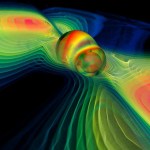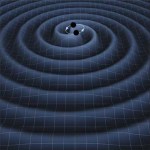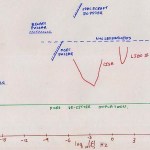gravitational waves
In a validation of Albert Einstein's genius, the power of new technology, and the relevance of the scientific method (even if it takes a century), scientists working on a project called LIGO have witnessed ripples in the fabric of spacetime caused by gravitational waves. First predicted by Einstein in 1916 on the basis of general relativity, gravitational waves are cosmic shock waves that can result from the interactions of massive objects like black holes and neutron stars. Unlike electromagnetic waves, which pass through space, gravitational waves change the shape of space itself. Extremely…
"There is a single light of science, and to brighten it anywhere is to brighten it everywhere." -Isaac Asimov
One of the most spectacular and successful ideas of the 20th Century was Einstein's General Relativity, or the idea that matter and energy determines the curvature of spacetime, and the curvature of spacetime in turn determines how gravitation works.
Image credit: Hyper-Mathematics - Uzayzaman / Spacetime.
From the orbits of planets to the bending of starlight, General Relativity governs all gravitational phenomena in the Universe, and accurately describes every observation we've…
Like the stars she studies, Nifty Fifty Speaker and astrophysicist Maura McLaughlin has reached some lofty heights in her young career as she works to shed further light on the Universe and the physical laws governing it, including Einstein's theory of relativity. Maura is an assistant astrophysics professor at West Virginia University where her work mainly involves researching neutron stars - burned out remnants of stars known as pulsars that are formed in supernova explosions following the collapse of massive evolved stars.
"These exotic objects are more massive than the Sun, and can spin…
With the rumors of a Higgs Boson detected at Fermilab now getting the sort of official denial that in politics would mean the rumors were about to be confirmed in spectacular fashion, it's looking like we'll have to wait a little while longer before the next "Holy Grail" of physics gets discovered.
Strictly speaking, the only thing I recall being officially dubbed a "Holy Grail" that's been discovered was Bose-Einstein Condensation (BEC), first produced by eventual Nobelists Carl Wieman and Eric Cornell in 1995. Somebody, I think it was Keith Burnett of Oxford, was quoted in the media calling…
Nothing gets past you, does it? A scientific paper came out earlier this week, and I took a look at it, sighed, and Jamie asked me, "What?" And I said to her, "When I see bad science, it just makes me a little bit frustrated and sad." Of course, I had no intention to write about it.
But then Starts With A Bang reader Matt emailed me, and writes the following about this press release that he had seen:
You have two explanations for these gravitational waves now and that much I understand. But they make it sound as if symmetry breaking and inflation are competing theories. They aren't, right? Do…
Two summers ago, I was in Les Houches, France, for a summer school that turned out to be one of the best experiences of my life. Seriously, we'd wake up every day and this was the view from the school:
Well, the University/Institution that ran the school sends periodic updates to me. And they linked me to this release. Here's the interesting and (if it's true) sensational claim that the release makes:
Recently, a team of theorists ... performed a new analysis of all available CMB and LSS data including the WMAP and Sloan data and favor an inflation model where exist primordial gravitational…




